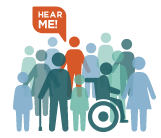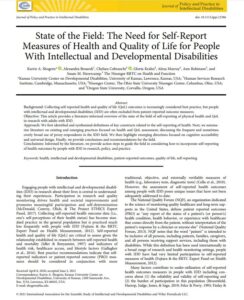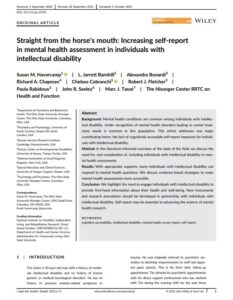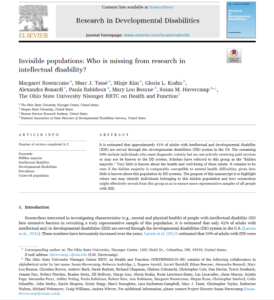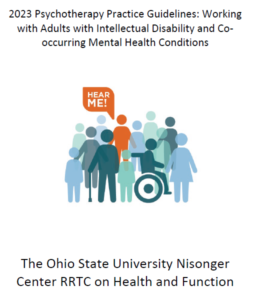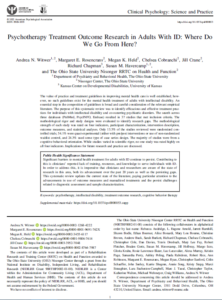 The Nisonger RRTC will study and report on the state of health care for individuals with intellectual and developmental disabilities (ID/DD).
The Nisonger RRTC will study and report on the state of health care for individuals with intellectual and developmental disabilities (ID/DD).
Papers published by the RRTC research team will address the following topics:
- Defining and Assessing Health
- Identifying Mental Health and Intellectual Disability
- Mental Health Treatment
Results of our studies will:
- Identify gaps in current knowledge
- Make recommendations to disability researchers and healthcare professionals
- Give individuals with ID/DD strategies to self-report their health status
- Share information on making healthcare accessible to individuals with ID/DD
- Discuss ways to engage individuals with ID/DD in participatory action research
Select publications will also be translated into clear language products. This page will be updated as the team publishes new papers.
- What does it mean to be healthy?
- How do we know if someone is healthy or not healthy?
It’s time to reconsider how we define health: Perspective from disability and chronic condition
Krahn, G., Robinson, A., Murray, A., Havercamp, S.M., and the Nisonger RRTC on Health and Function. (2021). It’s time to reconsider how we define health: Perspective from disability and chronic condition. Disability and Health Journal. https://doi.org/10.1016/j.dhjo.2021.101129
Shogren, K.A., Bonardi, A., Cobranchi, C., Krahn, G., Murray, A., Robinson, A., Havercamp, S.M., and the Nisonger RRTC on Health and Function. (2021). State of the field: The need for self-report measures of health and quality of life for people with intellectual and developmental disabilities. Journal of Policy and Practice in Intellectual Disabilities. https://doi.org/10.1111/jppi.12386
Havercamp, S. M., Barnhill, L. J., Bonardi, A., Chapman, R., Cobranchi, C., Fletcher, R., Rabidoux, P., Seeley, J. R., Tasse’, M. J. and the Nisonger Center RRTC on Health and Function. (2021). Straight from the horse’s mouth: Increasing self-report in mental health assessment in individuals with intellectual disability. Journal of Applied Research in Intellectual Disability, 1-9. https://doi.org/10.1111/jar.12952
Walton, K., Krahn, G. L., Buck, A., Andridge, R., Lecavalier, L., Hollway, J. A., Davies, D. K., Arnold, L. E., Havercamp, S. M. & the Nisonger RRTC on Health and Function. (2022). Putting “ME” into measurement: Adapting self-report health measures for use with individuals with intellectual disability. Research in Developmental Disabilities, 128(2022), 1-14. https://doi.org/10.1016/j.ridd.2022.104298
Identifying Mental Health (MH) and Intellectual Disability (ID)
- How many adults in the United States have ID?
- How many adults with ID have MH issues in the United States?
Invisible populations: Who is missing from research in intellectual disability?
Rosencrans, M., Tassé, M. J., Kim, M., Krahn, G., Bonardi, A., Rabidoux, P., Bourne, M. L., Havercamp, S.M., and The Ohio State University Nisonger RRTC on Health and Function. (2021). Invisible populations: Who is missing from research in intellectual disability? 119, 1-10. Research in Developmental Disabilities. https://doi.org/10.1016/j.ridd.2021.104117
- What are the best ways to treat adults with intellectual disability (ID) who have co-occurring MH conditions?
- How can MH providers improve their practice of treating adults with ID?
Witwer, A. N., Cary, E., Chapman, R., Arnold, L.E., Havercamp, S. & Nisonger RRTC on Health and Function. (2023). Psychotherapy practice guidelines: Working with adults with intellectual disability and co-occurring mental health conditions.
Psychotherapy treatment outcome research in adults with ID: Where do we go from here?
Witwer, A. N., Rosencrans, M. E., Held, M. K., Cobranchi, C., Crane, J., Chapman, R., Havercamp, S. M. & The Ohio State University Nisonger RRTC on Health and Function (2022). Psychotherapy Treatment Outcome Research in Adults With ID: Where Do We Go From Here? Clinical Psychology: Science and Practice. http://dx.doi.org/10.1037/cps0000053
Witwer, A. N., Walton, K., Held, M. K., Rosencrans, M., Cobranchi, C., Fletcher, R., Crane, J. M., Chapman, R., & Havercamp, S. (2022).
A scoping review of psychological interventions, accommodations, and assessments for adults with intellectual disability. Professional
Psychology: Research and Practice. Advance online publication. https://doi.org/10.1037/pro0000474

